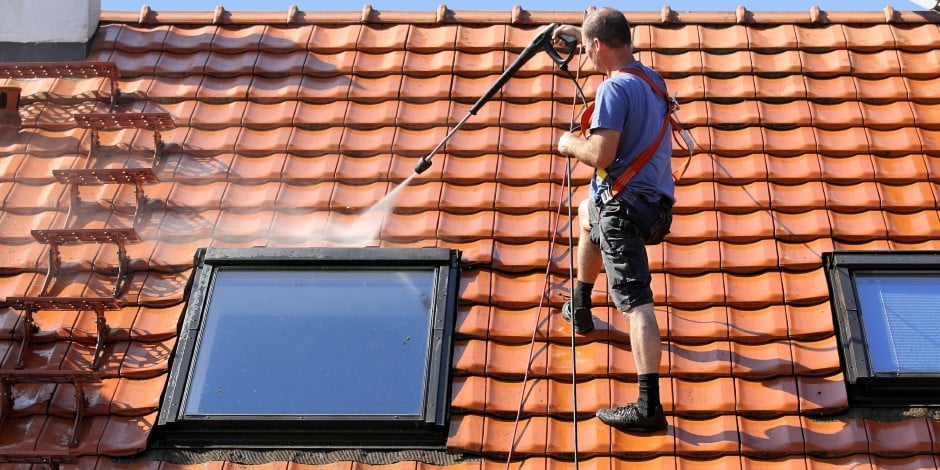Soft Wash Pump Systems: 5 Features to Look For

Shawn Glover, VP of Sales, Jun 6, 2023

The soft wash industry provides cleaning services for the exteriors of residential and commercial properties. Examples include cleaning stains off concrete driveways or removing mold, moss, and mildew from siding, roofs, and fences. To do so effectively and safely requires the right soft wash pump.
What is a Soft Wash Pump System?
Regular high-pressure washing systems rely heavily on mechanical removal of stains and can damage surfaces or cause moisture penetration under siding or shingles. A soft wash system uses a gentler application in combination with chemicals to remove stains and debris and minimize the potential for damage.
Soft wash chemical examples include:
- Bleach (sodium hypochlorite)
- Algaecides
- Surfactants
- Water
Engineers and equipment designers often struggle to find a pump that stands up to harsh chemicals and produces enough flow and pressure to reach surfaces. Here, we’ll cover five important features to look for in a soft wash system to help your business succeed in this competitive marketplace.
- Proper GPM & PSI
- Quiet Operation & Sustainability
- Chemical Compatibility
- Pump Longevity
- Soft Wash Pump Cost
1. Proper GPM & PSI
Gallons-per-minute (GPM) and pressure-per-square-inch (PSI) ratings are critical aspects of soft wash or pressure washer systems. Without the right combination of both, a sprayer won’t have enough vertical and horizontal throw to reach surfaces, which is especially important when cleaning a two- or three-story home. While some pump sprayers can spray that high, they often don’t provide proper coverage at those distances.
Producing enough flow and pressure to evenly reach from ground to eave, without getting on a ladder, is also an important safety factor. Contrary to popular belief, simply increasing the pressure won't get the desired results; having proper flow is what’s needed.
The recommended flow and pressure for a soft wash system is about 6.5 GPM at 150 PSI. Paired with the right nozzle, this combination will produce a vertical throw of around 35 feet. If you cut the flow in half to 3 GPM, you’d only get half the vertical throw.
VIEW PUMPTEC SOFT WASH PUMP RECOMMENDATIONS
2. Quiet Operation & Sustainability
Many residential neighborhoods have noise ordinances with a maximum decibel threshold during certain times of the day. Most gas-powered engines that run soft wash sprayers exceed those thresholds. An ordinance might restrict loud noises before 10 a.m. In this scenario, operators might sit idle for a couple of hours, resulting in lost productivity and revenue.
Using battery-powered electric pumps versus gas-powered engines results in whisper-quiet operation. If noise levels and minimizing disruption to area businesses and residents are a concern, use a 12V electric plunger pump system. It can recharge in between jobs without missing a beat and rivals the performance of gas-powered systems.
Another advantage of electric pumps is their ability to comply with legislation restricting gas-powered engines. Sustainability initiatives are gaining momentum across the country, and soft wash system manufacturers and operators will likely need to transition to electric eventually.
RELATED GUIDE: How to Convert from Gas to Electric Pump Systems
3. Chemical Compatibility
The most common chemical used in the soft wash industry is commercial-grade sodium hydrochlorite, a form of bleach. Technicians will use concentrations ranging from 1% for side walks up to 12% for mold and mildew on roofs. Cleaning chemicals are highly corrosive and can easily damage diaphragm pumps made with aluminum or stainless steel components.
Ideally, pumps should be engineered primarily out of PVC, which has an A-rating for soft wash chemical compatibility. In addition to PVC pump housings, engineers also need to examine other components. For example, we recommend Viton seals vs. Buna, as well as ceramic plungers. Furthermore, valve bodies should be made of Alloy C-276, a highly corrosion-resistant metal alloy.
RECOMMENDED SOFT WASH PUMP: Pumptec X-PVC Series
4. Pump Longevity
Unfortunately, because of poor chemical compatibility, it’s not uncommon for soft wash spray operators to replace their pumps multiple times throughout the year. In some businesses, cheaper diaphragm pumps are practically treated as disposable because they’re so unreliable, placing a strain on soft wash operations and the environment.
Sodium hypochlorite-compatible pumps will last significantly longer than traditional diaphragm pumps. The flexible components of diaphragm pumps can easily rupture under high pressure, and they don’t maintain consistent pressure and flow.
Chemically compatible pumps translate to reduced downtime and labor, and minimize the need for repairs. Another way to extend the life of a soft wash pump is to use proper accessories, like unloader valves. Unloader valves help reduce heat and pressure buildup by activating a bypass mode when the pump runs without pulling the spray gun trigger.
5. Soft Wash Pump Cost
Directly tied to longevity is the cost of soft wash pumps. However, a value comparison is a better way to approach the topic. You’ll likely spend more for an A-rated soft wash pump, but the savings over the long term will far outweigh the cost difference. If a chemically compatible pump costs four times as much but lasts 10 times longer, there is significant cost savings potential.
With better performance and fewer breakdowns, operators can get in and out of jobs faster and won’t need to spend time making repairs. Employees can spend time on more critical functions that bring in revenue. Likewise, a better performing pump will result in happier customers, leading to more repeat business and referrals. Another consideration is the risk to employees and potential workers’ compensation claims that might result from climbing onto ladders and rooftops.
When considering a soft wash pump solution, it’s critical to factor in its total cost of ownership. Here at Pumptec, we’ve engineered a powerful and reliable electric soft wash plunger pump, the only A-rated system of its kind in the marketplace. Our X-PVC pump is made of highly resistant materials and engineered to be durable and long-lasting. We’re also developing an innovative unloader accessory that helps further enhance performance and increase longevity. Ask us about it!
Our soft wash systems address the challenges of the industry head on. Reach out to our pump experts to talk through your specific challenges and how our custom X-series soft wash pump can overcome them. Also, check out our case study below to see how one company experienced significant success.



![What to Look for in Portable Sanitation Industry Pumps [Video]](https://www.pumptec.com/hs-fs/hubfs/images/blog/group-of-x-6.jpg?width=300&height=200&name=group-of-x-6.jpg)